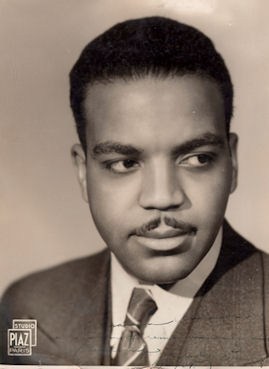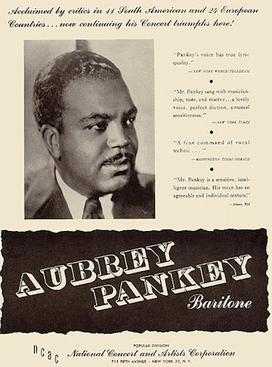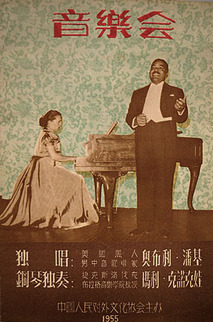Aubrey Pankey facts for kids
Aubrey W. Pankey (June 17, 1905 – May 8, 1971) was an American singer with a deep voice, known as a baritone. He became famous in the 1930s for singing classical German songs called Lieder. In 1956, he moved permanently to East Germany. He was the first American to sing in the People's Republic of China in 1956.
Contents
Early Life and Musical Training
Aubrey Pankey was an African-American born in Pittsburgh. He grew up in the Hill District neighborhood. His father, a railroad worker, died when Aubrey was 14. His mother, Lucy Belle Pankey, who sang in a group, died a year later.
Aubrey started singing at a young age in a church choir. In 1921, he went to Hampton University in Virginia. He first studied mechanical engineering there. Later, he decided to become a concert singer.
Mentors and Early Performances
Composer R. Nathaniel Dett, who was the music director at Hampton University, helped Aubrey a lot. Dett said Aubrey had a natural talent for music. Aubrey toured the country performing Dett's songs.
Famous tenor Roland Hayes also supported Aubrey's singing career. The New York Times newspaper noticed his performances as early as 1925. He received a scholarship to study at the Oberlin Conservatory of Music in Ohio. Aubrey also studied music in Boston and New York. He worked many jobs to pay for his education.
European Career in the 1930s
In 1930, Aubrey gave a successful concert in Boston. This encouraged him to study music in Europe. He traveled to Vienna, Austria, that year. He studied at the Neues Wiener Konservatorium.
Acclaim and Challenges in Europe
In 1931, a performance in Vienna caught the attention of the Austrian newspapers. Critics praised his musical talent. They said he sang Schubert and Richard Strauss with great feeling. One critic wrote that he was a "messenger of culture."
In 1933, a concert in Salzburg, Austria, faced protests from Nazis. They handed out flyers. These flyers complained about foreigners taking money from German musicians. They also disliked foreigners, especially Black people and Jewish people, singing German music. Because of this, Aubrey was banned from singing in Germany in 1934. A tour of Italy was also canceled in 1937.
Life in Paris
Aubrey Pankey moved to Paris, France, in 1933. There, he continued his music studies. He started working in French radio. He was introduced by the widow of Georges Clemenceau, a former French leader. While in France, he also acted in films. Important politicians and public figures attended his concerts. His performances received good reviews in newspapers in Norway and France. He sang in English, French, German, and Italian.
Return to the United States
In November 1939, Aubrey returned to the United States after six years in Paris. His New York City debut was in 1940 at Town Hall.
Notable US Performances
Aubrey performed at the dedication of the Sara Delano Roosevelt Memorial House in 1943. He gave a concert at Carnegie Hall in New York City in 1944. This concert was put on by the National Negro Congress. His extra songs that evening included a march popular with Soviet troops. He also sang Die Moorsoldaten, a song about people in Nazi concentration camps. He performed at a concert for Russian war relief in 1944.
In 1945, Aubrey performed at three shows. These marked the opening of the United Nations Conference on International Organization. Also in 1945, he performed at the Lenin Memorial Meeting at Madison Square Garden. He was a sponsor of the 1949 Cultural and Scientific Conference for World Peace in New York. Aubrey also taught voice at the Metropolitan Music School in New York in 1944. This school aimed to promote tolerance and unity.
International Tours as Ambassador
Aubrey Pankey was the first African American to represent the US as a goodwill ambassador. He toured Latin America in 1942 and again in 1945. He was also the first African American to sing in Jerusalem. A critic there praised his "dark and warm" voice. Billboard magazine noted his popularity in Israel in 1950.
A 1947 European tour was very successful. Many shows sold out, and extra performances were added. After this tour, Aubrey noted that Europeans were interested in race relations in the US. He spoke at a peace conference in Wrocław during a 1948 European tour.
Later Career and Move to East Germany
Aubrey returned to Paris in 1948. He supported the 1949 World Congress of Advocates of Peace in Paris. The US House Un-American Activities Committee claimed Aubrey was linked to groups they called "Communist-front organizations."
In 1953, the French government told Aubrey he had to leave the country. This was thought to be because he protested the execution of Julius and Ethel Rosenberg in the US. The Rosenbergs were accused of sharing secrets about the atomic bomb. After being denied permission to live in France and Britain, he moved to East Germany.
Teaching and Performing in East Germany
In 1956, he began teaching at the German Music School in East Berlin. Aubrey felt that he was sometimes judged only by his skin color. He wrote to the Socialist Unity Party of Germany leaders. He complained that the national opera house offered him a role just because he was Black. A party leader, Alfred Kurella, responded. He said it was important to speak out against fake sympathy for Black people. He felt this sympathy sometimes hid racist attitudes.
In November 1955, Aubrey traveled to Beijing, China. He was invited by the Chinese People's Association for Cultural Relations with Foreign Countries. He gave a series of concerts there. He was the first American singer to perform in China since the People's Republic was formed in 1949. Aubrey lived in East Germany from 1954 until he died.
Personal Life and Death
Aubrey Pankey married Kathryn Weatherly on April 27, 1945, in New Rochelle, New York. Kathryn was his public relations agent. Aubrey had been married before to a French woman.
Aubrey Pankey died in a car crash on May 8, 1971, in East Berlin. He was 65 years old. He had performed over 200 times in 60 cities across 24 countries during his career.
See Also
- African Americans in Paris
 | Misty Copeland |
 | Raven Wilkinson |
 | Debra Austin |
 | Aesha Ash |




